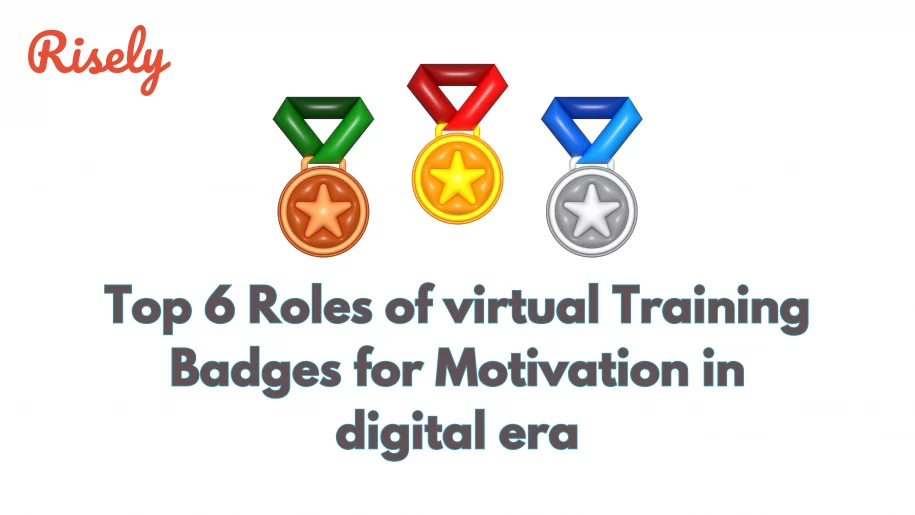Top 6 Roles of virtual Training Badges for Motivation in digital era
Are you looking for a powerful tool to boost employee motivation and engagement? Look no further than training badges. This blog will explore the importance of training badges in employee motivation and how they work. Discover why organizations should use training badges and how to implement them effectively. We will also dive into the concept of digital badges and their role in the digital era. Get ready to unleash the power of training badges for success in your organization’s learning and development initiatives.The importance of training badges in employee motivation
Training badges can play a significant role in employee motivation for several reasons. Here’s an explanation of their importance:- Recognition and Achievement: Training badges are tangible symbols of accomplishment and recognition. When employees earn badges for completing training programs or acquiring new skills, it acknowledges their efforts and achievements. This recognition boosts their self-esteem, enhances their sense of accomplishment, and motivates them to continue learning and improving.
- Goal Setting and Progress Tracking: Training badges can act as milestones or goals for employees to strive towards. They clearly indicate progress and visually represent the skills or knowledge gained. By tracking their badge collection or progress, employees can see how far they’ve come, which can inspire them to set new goals and pursue further development.
- Competitive Environment: Training badges can create a sense of friendly rivalry among employees in organizations where healthy competition is encouraged. As individuals strive to earn more badges, it can foster a culture of continuous learning and improvement. The desire to collect badges and demonstrate expertise can fuel healthy competition, promoting a motivated and engaged workforce.
- Career Development and Advancement: Training badges can directly impact career development and advancement opportunities. They provide evidence of acquired skills and competencies, which can enhance an employee’s professional profile. Managers and employers may consider badge achievements when deciding promotions, assignments, or new opportunities. The potential for career growth and recognition motivates employees to participate in training programs and earn relevant badges actively.
- Social Recognition and Peer Support: Training badges can facilitate social recognition within the organization. Employees can proudly display badges on their profiles or share their achievements with colleagues. This creates a supportive environment where peers can acknowledge and appreciate each other’s accomplishments, fostering a sense of camaraderie and motivation among employees.
Other Interesting Reads
Why should organizations Implement online training platforms for training badges?
Organizations should implement online training platforms that handle assessments, gamification, and badges for several unique benefits:- Centralized Management: By using an online training platform that takes assessments, gamification, and badges, organizations can centralize their training efforts. All aspects of training, including content creation, assessments, progress tracking, and badge issuance, can be managed in one place. This streamlines the training process and makes tracking learners’ progress and achievements easier.
- Automated Assessments: Online training platforms can automate the assessment process, saving time and effort for both trainers and learners. The platform can administer quizzes, tests, or evaluations and automatically grade and provide feedback. This eliminates manual grading and allows trainers to focus on other essential tasks.
- Gamification Elements: Gamification, using game elements and mechanics in non-game contexts, can significantly enhance the training experience. Online training platforms often provide built-in gamification features such as leaderboards, points, levels, and challenges. These elements increase engagement, motivation, and healthy competition among learners, improving learning outcomes.
- Badge Management: Implementing an online training platform that handles badges simplifies the management and issuance of badges. The platform can automatically award badges based on predefined criteria, such as course completion or mastery of specific skills. This eliminates manual badge administration and ensures consistency and fairness in badge distribution.
- Enhanced Learner Experience: Online training platforms that integrate assessments, gamification, and badges offer participants a more engaging and immersive learning experience. Learners can track their progress, earn badges, and see how they compare to others in a gamified environment. This creates a sense of achievement, fosters a competitive spirit, and encourages continued participation and growth.
- Data-driven Insights: By utilizing an online training platform, organizations can gather valuable data and insights about learners’ performance, engagement, and progress. These platforms often provide analytics and reporting features that allow trainers and administrators to track completion rates, assessment scores, and badge attainment metrics. These insights help identify improvement areas, evaluate training programs’ effectiveness, and make data-driven decisions.
The Role of virtual badges in the digital era
In the digital era, virtual badges play a significant role in various aspects of our lives, ranging from education and professional development to gamification and online communities. These virtual badges, digital representations of achievements or accomplishments, offer several benefits and serve multiple purposes. Here is a brief overview of their role in the digital era:- Recognition and Motivation: Virtual badges serve as a form of credit and motivation in online environments. They acknowledge and celebrate individuals’ achievements, whether completing a course, mastering a skill, or reaching a milestone. These badges provide a sense of accomplishment and can encourage individuals to strive for further success.
- Skill Development and Learning: Virtual training badges are often utilized in educational platforms and online courses to track and showcase learners’ progress. They serve as visual markers of acquired skills or knowledge, motivating learners to continue their educational journey. Badges can be awarded for completing specific modules, demonstrating proficiency, or achieving specific learning outcomes.
- Credentialing and Verification: Virtual badges can act as digital credentials, verifying an individual’s expertise or accomplishment in a particular field. These badges can be shared on professional networking platforms, websites, or social media profiles, providing a convenient way to showcase skills and qualifications to potential employers, clients, or collaborators.
- Gamification and Engagement: In gamified environments, virtual badges are often used to engage users and drive participation. By offering badges for completing tasks, meeting goals, or participating in community activities, organizations can encourage users to engage with their platforms, products, or services actively. Badges can also foster healthy competition and social interaction among users.
- Community Building: Virtual badges can strengthen online communities and foster a sense of belonging. Individuals feel recognized and valued by awarding badges for active participation, contributions, or leadership within a community. Badges can serve as conversation starters, encouraging networking and collaboration among community members.
- Data and Analytics: Virtual badges provide valuable data and analytics for platform administrators. By tracking badge acquisition and usage patterns, organizations can gain insights into user behavior, engagement levels, and the effectiveness of their programs. This data can help tailor future offerings and enhance the overall user experience.
Conclusion
In conclusion, training badges motivate employees and drive their success. By recognizing and rewarding their achievements, training badges provide a sense of accomplishment and encourage continuous learning and growth. Organizations should embrace training badges to enhance employee engagement, improve skill development, and foster a learning culture. Utilizing online training platforms and implementing best practices for training badges can maximize their impact. Research has shown that training badges have proven highly effective in boosting learner engagement and retention rates. So, take advantage of the power of training badges for success.Ace performance reviews with strong feedback skills.
Master the art of constructive feedback by reviewing your skills with a free assessment now.
FAQs
Do LinkedIn skill badges matter?
Yes, LinkedIn skill badges can significantly impact your profile and professional reputation. They demonstrate your proficiency in specific skills and can be seen by potential employers, recruiters, and network connections. Skill badges can enhance your credibility and increase opportunities for career advancement.
Do LinkedIn skill badges matter?
Yes, LinkedIn skill badges can significantly impact your profile and professional reputation. They demonstrate your proficiency in specific skills and can be seen by potential employers, recruiters, and network connections. Skill badges can enhance your credibility and increase opportunities for career advancement.
What are the certificate badges for?
Certificate badges are awarded to individuals who have completed a specific training course or program. These badges prove completion and showcase your expertise in a particular field or skill set. Certificate badges can be displayed on resumes, online profiles, or professional portfolios.
What is a digital certification badge?
A digital certification badge is a virtual badge that represents an individual’s achievement or completion of a specific training or certification program. Online learning platforms or professional organizations typically issue these badges, which can be shared digitally on platforms like LinkedIn or personal websites. Digital certification badges provide a convenient and portable way to showcase one’s skills and qualifications to potential employers and professional networks.
Other Related Blogs
5 Steps Training Needs Assessment Model: Why It Is Important For Employees?
5 Steps Training Needs Assessment Model: Why It Is Important For Employees? Have you ever wondered why some training programs hit the bullseye while others miss the mark? Well, it’s…


